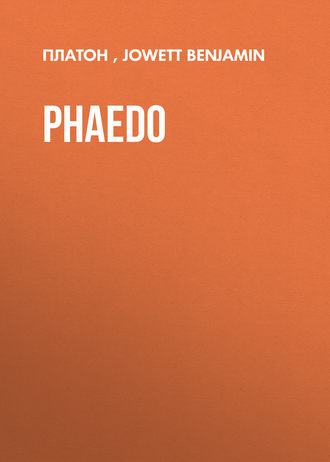 полная версия
полная версияPhaedo
Wherefore, Simmias, seeing all these things, what ought not we to do that we may obtain virtue and wisdom in this life? Fair is the prize, and the hope great!
A man of sense ought not to say, nor will I be very confident, that the description which I have given of the soul and her mansions is exactly true. But I do say that, inasmuch as the soul is shown to be immortal, he may venture to think, not improperly or unworthily, that something of the kind is true. The venture is a glorious one, and he ought to comfort himself with words like these, which is the reason why I lengthen out the tale. Wherefore, I say, let a man be of good cheer about his soul, who having cast away the pleasures and ornaments of the body as alien to him and working harm rather than good, has sought after the pleasures of knowledge; and has arrayed the soul, not in some foreign attire, but in her own proper jewels, temperance, and justice, and courage, and nobility, and truth – in these adorned she is ready to go on her journey to the world below, when her hour comes. You, Simmias and Cebes, and all other men, will depart at some time or other. Me already, as the tragic poet would say, the voice of fate calls. Soon I must drink the poison; and I think that I had better repair to the bath first, in order that the women may not have the trouble of washing my body after I am dead.
When he had done speaking, Crito said: And have you any commands for us, Socrates – anything to say about your children, or any other matter in which we can serve you?
Nothing particular, Crito, he replied: only, as I have always told you, take care of yourselves; that is a service which you may be ever rendering to me and mine and to all of us, whether you promise to do so or not. But if you have no thought for yourselves, and care not to walk according to the rule which I have prescribed for you, not now for the first time, however much you may profess or promise at the moment, it will be of no avail.
We will do our best, said Crito: And in what way shall we bury you?
In any way that you like; but you must get hold of me, and take care that I do not run away from you. Then he turned to us, and added with a smile: – I cannot make Crito believe that I am the same Socrates who have been talking and conducting the argument; he fancies that I am the other Socrates whom he will soon see, a dead body – and he asks, How shall he bury me? And though I have spoken many words in the endeavour to show that when I have drunk the poison I shall leave you and go to the joys of the blessed, – these words of mine, with which I was comforting you and myself, have had, as I perceive, no effect upon Crito. And therefore I want you to be surety for me to him now, as at the trial he was surety to the judges for me: but let the promise be of another sort; for he was surety for me to the judges that I would remain, and you must be my surety to him that I shall not remain, but go away and depart; and then he will suffer less at my death, and not be grieved when he sees my body being burned or buried. I would not have him sorrow at my hard lot, or say at the burial, Thus we lay out Socrates, or, Thus we follow him to the grave or bury him; for false words are not only evil in themselves, but they infect the soul with evil. Be of good cheer, then, my dear Crito, and say that you are burying my body only, and do with that whatever is usual, and what you think best.
When he had spoken these words, he arose and went into a chamber to bathe; Crito followed him and told us to wait. So we remained behind, talking and thinking of the subject of discourse, and also of the greatness of our sorrow; he was like a father of whom we were being bereaved, and we were about to pass the rest of our lives as orphans. When he had taken the bath his children were brought to him – (he had two young sons and an elder one); and the women of his family also came, and he talked to them and gave them a few directions in the presence of Crito; then he dismissed them and returned to us.
Now the hour of sunset was near, for a good deal of time had passed while he was within. When he came out, he sat down with us again after his bath, but not much was said. Soon the jailer, who was the servant of the Eleven, entered and stood by him, saying: – To you, Socrates, whom I know to be the noblest and gentlest and best of all who ever came to this place, I will not impute the angry feelings of other men, who rage and swear at me, when, in obedience to the authorities, I bid them drink the poison – indeed, I am sure that you will not be angry with me; for others, as you are aware, and not I, are to blame. And so fare you well, and try to bear lightly what must needs be – you know my errand. Then bursting into tears he turned away and went out.
Socrates looked at him and said: I return your good wishes, and will do as you bid. Then turning to us, he said, How charming the man is: since I have been in prison he has always been coming to see me, and at times he would talk to me, and was as good to me as could be, and now see how generously he sorrows on my account. We must do as he says, Crito; and therefore let the cup be brought, if the poison is prepared: if not, let the attendant prepare some.
Yet, said Crito, the sun is still upon the hill-tops, and I know that many a one has taken the draught late, and after the announcement has been made to him, he has eaten and drunk, and enjoyed the society of his beloved; do not hurry – there is time enough.
Socrates said: Yes, Crito, and they of whom you speak are right in so acting, for they think that they will be gainers by the delay; but I am right in not following their example, for I do not think that I should gain anything by drinking the poison a little later; I should only be ridiculous in my own eyes for sparing and saving a life which is already forfeit. Please then to do as I say, and not to refuse me.
Crito made a sign to the servant, who was standing by; and he went out, and having been absent for some time, returned with the jailer carrying the cup of poison. Socrates said: You, my good friend, who are experienced in these matters, shall give me directions how I am to proceed. The man answered: You have only to walk about until your legs are heavy, and then to lie down, and the poison will act. At the same time he handed the cup to Socrates, who in the easiest and gentlest manner, without the least fear or change of colour or feature, looking at the man with all his eyes, Echecrates, as his manner was, took the cup and said: What do you say about making a libation out of this cup to any god? May I, or not? The man answered: We only prepare, Socrates, just so much as we deem enough. I understand, he said: but I may and must ask the gods to prosper my journey from this to the other world – even so – and so be it according to my prayer. Then raising the cup to his lips, quite readily and cheerfully he drank off the poison. And hitherto most of us had been able to control our sorrow; but now when we saw him drinking, and saw too that he had finished the draught, we could no longer forbear, and in spite of myself my own tears were flowing fast; so that I covered my face and wept, not for him, but at the thought of my own calamity in having to part from such a friend. Nor was I the first; for Crito, when he found himself unable to restrain his tears, had got up, and I followed; and at that moment, Apollodorus, who had been weeping all the time, broke out in a loud and passionate cry which made cowards of us all. Socrates alone retained his calmness: What is this strange outcry? he said. I sent away the women mainly in order that they might not misbehave in this way, for I have been told that a man should die in peace. Be quiet, then, and have patience. When we heard his words we were ashamed, and refrained our tears; and he walked about until, as he said, his legs began to fail, and then he lay on his back, according to the directions, and the man who gave him the poison now and then looked at his feet and legs; and after a while he pressed his foot hard, and asked him if he could feel; and he said, No; and then his leg, and so upwards and upwards, and showed us that he was cold and stiff. And he felt them himself, and said: When the poison reaches the heart, that will be the end. He was beginning to grow cold about the groin, when he uncovered his face, for he had covered himself up, and said – they were his last words – he said: Crito, I owe a cock to Asclepius; will you remember to pay the debt? The debt shall be paid, said Crito; is there anything else? There was no answer to this question; but in a minute or two a movement was heard, and the attendants uncovered him; his eyes were set, and Crito closed his eyes and mouth.
Such was the end, Echecrates, of our friend; concerning whom I may truly say, that of all the men of his time whom I have known, he was the wisest and justest and best.









